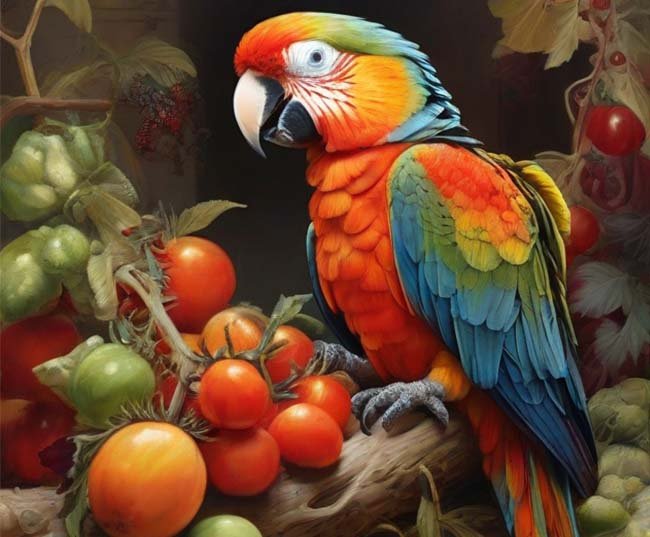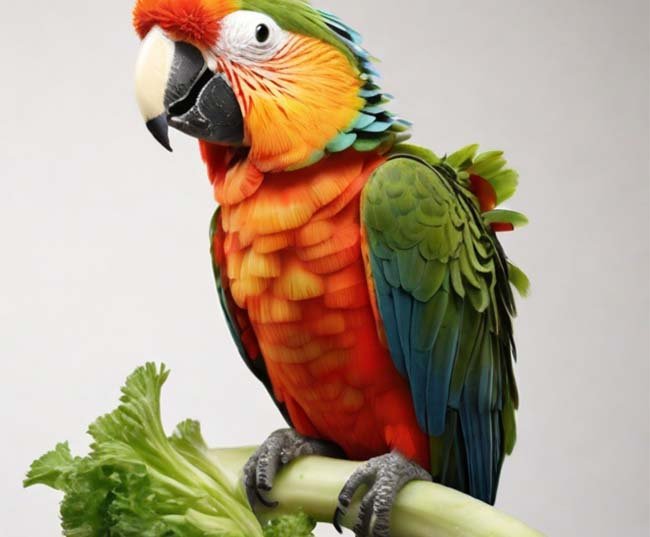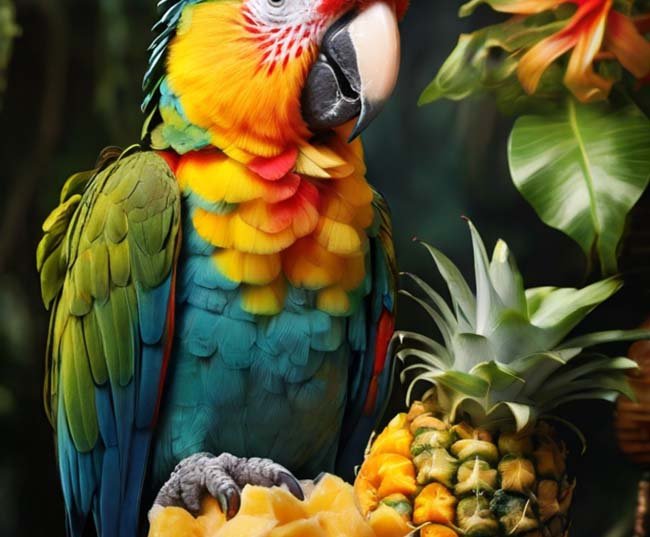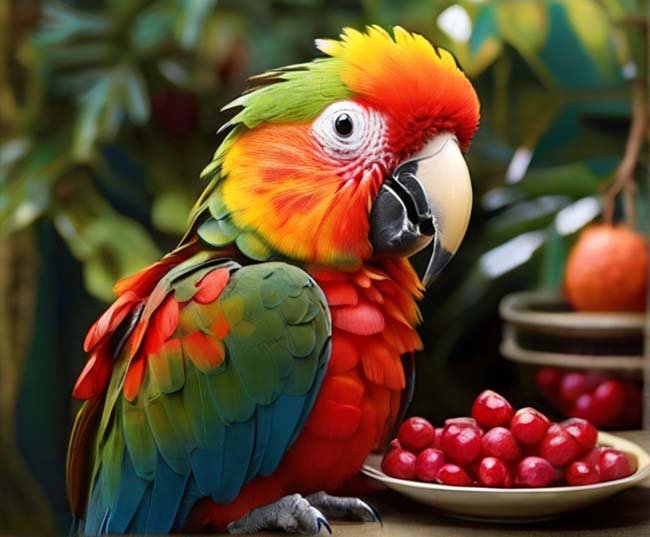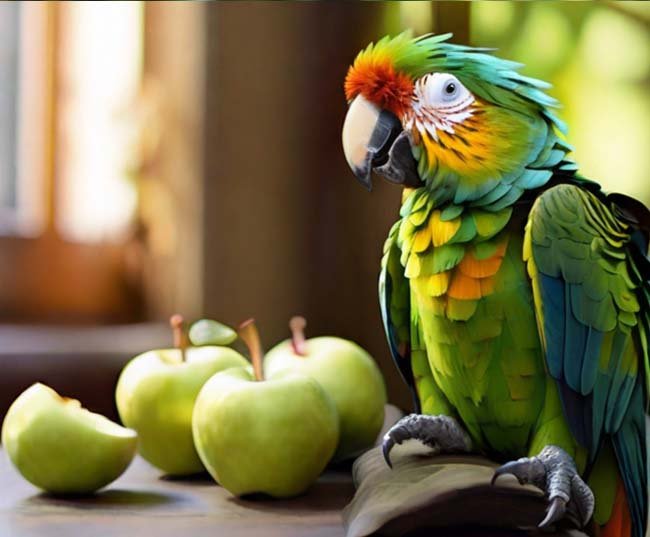Can Parrots Eat Grapes? Safety & tips Guide
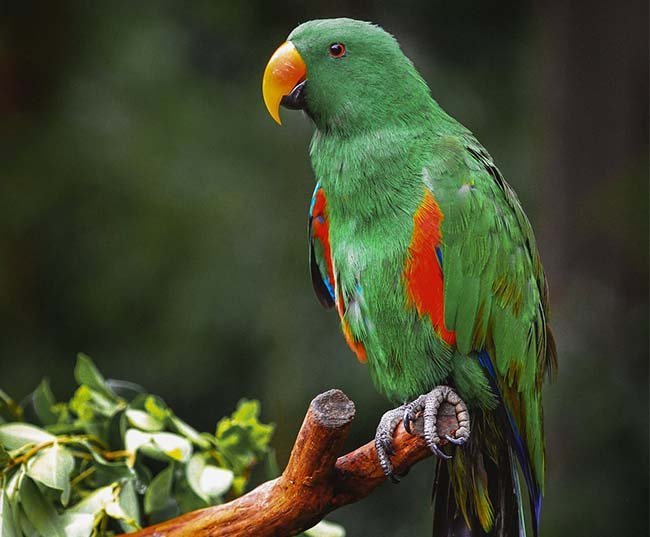
Parrots are delightful and intelligent feathered companions that need a balanced and nutritious diet to thrive.
As a responsible parrot owner, it’s essential to provide them with safe fruits combined with their daily meals.
One of the most commonly asked questions by parrot owners is whether their pets can eat grapes.
While grapes are safe fruits for parrots, it’s crucial to understand their nutritional needs before incorporating them into their diet significantly.
In this section, I will explore the safety of feeding grapes to parrots and provide essential tips and insights on how to incorporate grapes into their feeding routine safely.
We will also address any potential risks and precautions that need to be taken to ensure the health and well-being of your feathered friends.
Without any delay, let’s dive into it.
Key Takeaways
- Grapes are safe fruits for parrots if introduced into their diet gradually and in moderation
- A balanced and varied diet is crucial for a parrot’s overall health and well-being
- It’s essential to monitor your parrot’s response to grapes and other fruits to avoid any adverse reactions
- Consult with a veterinarian if you have any concerns about feeding grapes to your parrot
- Alternative safe fruits for parrots include apples, pears, berries, and bananas
Can Parrots Eat Grapes? Explained
You bet parrots can eat grapes! Lots of parrots enjoy them as a sweet and juicy treat. Think about it like this: grapes are kind of like candy for birds!
They’re a tasty change from their regular food and have some good vitamins and minerals too, like vitamin C and potassium, which helps their bodies stay healthy and strong.
But there are a few things to remember, just like when you eat candy:
- Small bites: Grapes are a bit big for a parrot, so make sure you cut them into smaller pieces before giving them to your feathered friend. This way, they won’t choke or have trouble swallowing.
- Seeds are okay: The seeds inside grapes are totally safe for parrots to eat. They might even enjoy crunching on them!
- Moderation matters: Even though grapes are tasty, they shouldn’t be the only thing your parrot eats. They need a balanced diet of pellets, veggies, and other healthy foods to stay happy and healthy. Think of grapes as a fun treat, not a main course!
1). Understanding a Parrot’s Dietary Needs
As responsible pet owners, it’s crucial to understand the nutritional needs of your feathered companion before feeding them any food.
When it comes to the best foods for pet parrots, it’s essential to offer a diverse diet that includes fresh vegetables, fruits, grains, and proteins.
Grapes make a great addition to a parrot’s diet, providing them with essential vitamins and minerals.
These tasty fruits are high in fiber, vitamin C, and antioxidants. The nutritional value of grapes for parrots lies in their ability to aid in digestive health and boost their immune system.
Best Foods for Pet Parrots
| Fruits | Vegetables | Grains and Seeds | Proteins |
|---|---|---|---|
| Berries | Leafy Greens | Brown Rice | Lean Meat |
| Apples | Carrots | Quinoa | Eggs |
| Oranges | Peppers | Millet | Legumes |
| Papaya | Squash | Whole Wheat Pasta | Nuts and Seeds |
It’s important to rotate fruits and vegetables, so your bird receives a combination of essential nutrients and doesn’t get bored with eating the same food daily.
When it comes to protein sources, it’s best to stick to lean meats and legumes such as chicken, turkey, lentils, and beans.
It’s crucial to avoid processed and fatty foods, which can be detrimental to their overall health.
By offering a diverse range of nutrient-rich foods, you can ensure that your parrot receives a balanced diet, promoting their overall health and wellness.
2). Grapes: Safe or Toxic for Parrots?
One of the most frequently asked questions regarding parrots’ diet is whether grapes are safe for these birds or not.
While grapes are generally non-toxic to parrots, several risks need to be taken into consideration when feeding grapes to your feathered companion.
The primary issue with grapes is the possibility of choking. The round shape and size of grapes can pose a choking hazard, particularly for smaller birds like parakeets.
To minimize this risk, it’s best to chop or slice the grapes into smaller pieces before feeding them to your parrot.
Another factor to consider is the pesticide residue that might be found on grapes. Non-organic grapes may contain harmful chemicals that can be toxic to parrots when ingested.
Therefore, it’s advisable to wash grapes thoroughly and consider buying organic grape varieties whenever possible.
Finally, grapes’ high sugar content should be kept in check. Too much sugar can lead to obesity and other health issues.
While parrots can consume grapes as part of their diet, these should be given in moderation and should not replace the essential nutrients that a parrot needs to thrive.
Remember, a responsible parrot parent should consider the potential risks associated with feeding grapes to their parrots. By chopping or slicing grapes, choosing organic varieties, and limiting sugar intake, you can safely incorporate grapes into your parrot’s diet without compromising their health.
3). Benefits of Grape Consumption for Parrots
As a nutritious fruit, grapes can offer numerous health benefits to your feathered companion. Here are some of the essential nutrients found in grapes:
| Nutrient | Function |
|---|---|
| Vitamin C | Boosts the immune system and promotes healthy skin and feathers. |
| Potassium | Regulates blood pressure and promotes a healthy heart. |
| Antioxidants | Helps to remove toxins from the body, preventing cell damage and illness. |
| Fiber | Promotes digestive health, preventing constipation and diarrhea. |
Incorporating grapes into your parrot’s diet can also improve their overall well-being.
The nutrients found in grapes can contribute to healthy skin, shiny feathers, and a more robust immune system.
Other than that, the natural sugar content in grapes can provide a quick energy boost to your feathered friend.
But, be mindful of the serving size and frequency of providing grapes to your parrot. As with any food, moderation is key to maintaining a balanced diet for your feathered companion.
4). Introducing Grapes to Your Parrot
If you decide to introduce grapes to your parrot’s diet, it’s important to do so gradually. Start by offering a small piece of grape and monitor their reaction.
If your parrot is hesitant to try it, you can try offering it in different ways, like sliced or mashed.
Here’s a step-by-step guide to introducing grapes to your parrot:
- Wash the grapes thoroughly to remove any pesticides or chemicals.
- Cut the grapes into small, bite-sized pieces.
- Offer a small piece of grape to your parrot, either on its own or mixed in with their usual food.
- Observe your parrot’s reaction, and if they enjoy the taste, you can gradually increase the amount over time.
It’s important to remember that while grapes are safe for parrots to consume, they should be given as an occasional treat and not as a significant part of their diet.
Too many grapes can lead to digestive problems or an upset stomach.
Always make sure to remove any uneaten grapes from your pet’s cage to prevent bacterial growth and spoilage.
Keep in mind, never offer your parrot grapes that have seeds or pits, as they can be a choking hazard.
By introducing grapes gradually and monitoring their response, you can safely include this delicious fruit in your parrot’s diet as a special treat.
5). Serving Size and Frequency
When it comes to feeding grapes to your parrot, it’s crucial to understand the appropriate serving size and frequency.
While grapes are a safe fruit for parrots, consuming too many can lead to health issues such as obesity and digestive problems.
As a general rule of thumb, a parrot’s daily diet should consist of 70-80% high-quality pellets, with the remaining percentage made up of fresh fruits and vegetables.
When it comes to grapes, a serving size of one grape per day for a small-sized parrot is sufficient. For larger parrots, you can increase the serving size up to two to three grapes per day.
It’s important to note that overfeeding grapes can result in a high intake of sugar, which can lead to health problems.
However, always remove any seeds from the grapes before offering them to your parrot, as they can be a choking hazard.
Frequency of Grape Consumption
| Parrot Size | Serving Size | Frequency |
|---|---|---|
| Small | 1 grape | Once a day |
| Medium | 2 grapes | Once a day |
| Large | 3 grapes | Once a day |
By following these guidelines for serving size and frequency, you can safely incorporate grapes into your parrot’s diet while maintaining a healthy balance.
6). Potential Risks and Precautions
While grapes are generally safe for parrots to eat, it’s important to be aware of any potential risks associated with their consumption.
One potential issue is with seeds, which can be a hazard as they may cause choking or intestinal problems for parrots.
It’s essential to source high-quality grapes that are free of harmful pesticides and chemicals. It is recommended to wash grapes thoroughly before feeding them to your parrot.
Precautions:
- Avoid feeding your parrot grapes regularly. Moderation is key.
- Don’t serve grapes in large chunks, as they can be a choking hazard. Cut grapes into smaller pieces to make them easier to eat.
- Monitor your parrot for any signs of digestive issues, such as vomiting or diarrhea, after eating grapes.
- Always consult with a veterinarian if you have any concerns about your parrot’s diet or health.
Many other fruits are safe for parrots to eat, such as apples, pears, and bananas. By offering a well-rounded diet and taking necessary precautions when feeding grapes, you can ensure the safety and well-being of your feathered friend.
7). Alternatives to Grapes in a Parrot’s Diet
If you’re looking for safe fruits to add to your parrot’s diet, there are plenty of alternatives to grapes. Here are some ideas to diversify your feathered friend’s meals:
1). Berries
Berries are a great source of vitamins and antioxidants, and many of them are safe for your parrot to eat. Blueberries, strawberries, raspberries, and blackberries are all safe options to consider.
2). Apples
Apples are a healthy and safe fruit for parrots to enjoy. Be sure to remove the seeds and core first, as they contain traces of cyanide that can be harmful to your parrot.
3). Bananas
Bananas are a delicious and nutritious fruit that your parrot will love. They are a great source of potassium and other essential vitamins and minerals.
4). Papayas
Papayas are a tropical fruit that can add some variety to your parrot’s diet. They are high in vitamin C and antioxidants, making them a healthy choice for your feathered friend.
5). Mangoes
Mangoes are another tropical fruit that are safe for parrots to eat. They are packed with vitamins and minerals, and their sweet flavor is sure to be a hit with your feathered companion.
By incorporating a variety of safe fruits into your parrot’s diet, you can provide them with essential nutrients and keep their meals interesting and exciting.
Conclusion
In conclusion, incorporating grapes into a parrot’s diet can be safe and provide potential health benefits, but it’s important to consider their overall nutritional needs and any potential risks.
As a responsible pet owner, I always monitor my parrot’s response to new foods and consult with my veterinarian if I have any concerns.
By following the proper guidelines on serving size and frequency, I can provide my feathered friend with a varied and nutritious diet that includes grapes.
So, can parrots eat grapes? Yes, they can, but with caution and proper preparation. Grapes can be a tasty and healthy addition to a parrot’s diet, but it’s always essential to prioritize their safety and well-being.
Thank you for reading this guide on parrots and grapes. I hope you found it informative and useful in caring for your feathered companion.
Frequently Asked Questions
Can parrots eat grapes?
Yes, parrots can safely consume grapes as part of their diet. However, it is important to offer grapes in moderation and alongside a balanced variety of other fruits and vegetables.
Are grapes toxic to parrots?
Grapes are generally safe for parrots to eat. However, it is crucial to avoid feeding them seeds, as they can be a choking hazard.
Additionally, ensure that the grapes are organic, thoroughly washed, and free from pesticides.
What are the health benefits of grapes for parrots?
Grapes are a good source of vitamins, minerals, and antioxidants, which contribute to a parrot’s overall health and well-being.
They provide essential nutrients, promote digestion, and support a strong immune system.
How should I introduce grapes to my parrot?
When introducing grapes to your parrot, start by offering small, bite-sized pieces.
Observe their reaction and gradually increase the serving size over time. It may take a few tries for your parrot to develop a taste for grapes.
What is the appropriate serving size and frequency of grapes for a parrot?
The serving size of grapes will depend on the size and species of your parrot. Generally, start with one or two grapes a few times a week. Monitor your parrot’s response and adjust the serving size accordingly to prevent overfeeding.
Are there any risks or precautions when feeding grapes to parrots?
While grapes are generally safe for parrots, there are a few risks and precautions to keep in mind.
Avoid feeding grapes with seeds, as they can pose a choking hazard. Also, ensure that the grapes are organic and thoroughly washed to remove any harmful residues or pesticides.
What are some alternative safe fruits for parrots if I don’t want to feed them grapes?
If you prefer not to include grapes in your parrot’s diet, there are plenty of other safe fruits you can offer.
Some examples include apples, bananas, blueberries, and strawberries. Always research and ensure that the fruits you choose are safe for your specific parrot species.
Should I consult a veterinarian before incorporating grapes into my parrot’s diet?
While it’s generally safe to include grapes in a parrot’s diet, it is always recommended to consult with a veterinarian before making any significant changes to their diet.
They can provide species-specific advice and help address any concerns you may have.

